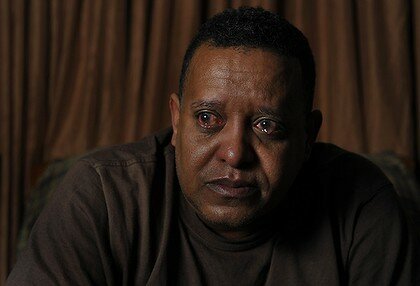 Selma Milovanovic (The Age) —Â IBRAHIM Khayre wipes away tears and shakes his head.
Selma Milovanovic (The Age) —Â IBRAHIM Khayre wipes away tears and shakes his head.
To him, the story of his nephew, Yacqub Khayre, an accused terrorist, is one of a system that failed an intelligent boy.
It is a story that began in the chaos of war in Mogadishu in 1991, when Ibrahim, who was already living in Australia, brought three-year-old Yacqub and the rest of the family here to save them. It continued in an unremarkable suburban house in Gladstone Park, where Yacqub grew up and was schooled locally, before becoming friends with Lebanese boys who were a ‘‘bad influence’’.
This week, it ended in the arrest of Yacqub, 22, who is alleged to have travelled to his birthplace, Somalia, this year, where he attended a camp where ‘‘weapons and military training may have happened’’. At the same time, his co-accused allegedly sought a religious ruling to give the group, suspected members of jihadist sect al-Shabab, approval to attack the Holsworthy army base in Sydney and a military target in Victoria.
Ibrahim Khayre is a law-abiding citizen who runs a coffee shop. He is not religious, looks after his family and otherwise keeps to himself. He migrated to Australia in 1985 and, in 1991, brought his brother, Yacqub’s father, to Australia along with the rest of the family.
According to Somali custom, the children, including Yacqub, were looked after by Yacqub’s grandfather, Abdi, and his wife, in the house where Ibrahim also lived.
Yacqub grew up to be a respectable, disciplined boy, who was nice to others and did well at school. But when he was in year 12, his grandfather, a major influence in his life, died and the boy lost his way.
It was around this time, Ibrahim says, that his nephew began hanging out with the boys who were a ‘‘bad influence’’.
He ran amok, his marks suffered. He stole Ibrahim’s car. Ibrahim rang the police in an effort to teach the boy a lesson about the law.
But when he got to Broadmeadows police station to pick up his wayward nephew, the police said the boy did not want to see him.
‘‘He’s already talking to social workers, he wants to move out of your house,’’ police said, ‘‘I said, ‘this child is 17, he’s immature, we want him back.’ The police said, ‘the welfare is here, it’s in the government’s hands’.
‘‘I was crying in the police station and they were laughing at us. They considered us a bunch of undesirables and they knew nothing about him.’’
Ibrahim walked away, feeling betrayed by the system he was unable to change.
In 2006, the police rang him, trying to track down Yacqub. ‘‘I said, I don’t know where he is. You took him from my house. He could be sleeping with terrorists for all I know.’’
A year earlier, the London underground bombings had happened. Ibrahim particularly remembered the stories of disaffected youth recruited by terrorists to kill innocents. He thought of those young men when the police rang him and wondered what was happening to his nephew.
A year later, uncle and nephew met at Yacqub’s parents’ place, where the young man, now living by himself, was visiting. Ibrahim told him: ‘‘The freedom you’ve been given, Yacqub, is not a freedom to annoy or do wrong to others.’’
The next time Ibrahim heard of his nephew was on Tuesday, when a man showed him a newspaper front page in his coffee shop.
Ibrahim thought back to that day when he sat at Broadmeadows police station crying, pleading to see his nephew
‘‘We were let down by the system,’’ Ibrahim says. ‘‘The state who said we want to help, they did not. They left him out in the cold. It’s the Government that tied our hands.’’
Now, Ibrahim sits at home, plagued by insomnia, crying constantly. ‘‘When I brought in the newspaper, my 13-year-old son said, ‘Dad, we’ve been stigmatised, our name is bad’.’’
Ibrahim can’t connect the strange reality he suddenly finds himself in with his work as a community liaison officer in Somalia in the 1990s, where he worked with local elders to ensure Australian peacekeepers were not attacked.
The Khayres lived in Mogadishu, but their tribe is originally from Baydo in Somalia’s south, known as the City of Death, where al-Shabab and other warring groups have killed scores of innocents.
Ibrahim’s tears flow as he utters the words he says he thought he would never say. He regrets bringing his family to Australia, even though it saved their lives.
‘‘We are here to contribute, not to be destructive, but I wish I wasn’t here.
‘‘I understand now what Aborigines meant when they said their kids were stolen. We live in a system designed to take away our rights as a family. It is a system where a human becomes a commodity.’’
______________________________________
Source: The Age



